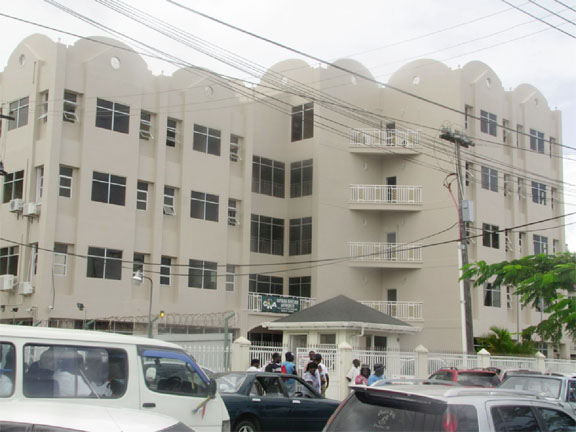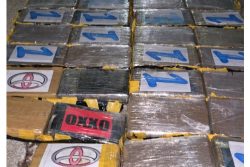-Auditor General’s report finds
A mere 17 per cent of self-employed persons submitted their 2017 income tax returns to the Guyana Revenue Authority (GRA) while less than 30 per cent of registered companies filed returns, continuing a trend that has previously attracted scrutiny as it means that billions in taxes are not being collected.
According to the 2017 Auditor General’s report, the 17 per cent translates to 18,351 of the 105,522 active registered self-employed persons in the TRIPS database as at 31 December 2017. The figure collected from them amounted to $4.9 billion. Non-compliance amounts to 83 per cent or 87,171 of tax payers in this category.
In 2016, 73,989 or 80 per cent of the active registrants did not file their returns.
Total income tax collected from self-employed taxpayers for the period January to December 2017 amounted to $4.9 billion, which is $338.1 million above the approved budgeted collections.
“Over the years, the Authority continued to experience difficulties in having delinquent self-employed persons comply with the requirements of the Income Tax Act,” the report said.

The GRA, in response, acknowledged the comments of the Auditor General but said that the list provided does not represent an “accurate” number of active taxpayers. Preliminary data cleansing activity have uncovered various categories of taxpayers to be removed, the GRA said while informing that work is currently on-going in this area.
The Authority also said that on a continuous basis, it has issued demand notices to the defaulting self-employed taxpayers and had also raised assessments in the absence of the returns in some instances. Providing a breakdown, the GRA said that during 2017, a total of 31,091 demand notices were issued while for 2018, the figure stood at 22,031.
Two cases were referred for legal action to be taken for failure to submit tax returns, the Authority informed. It added that in light of the number of self-employed taxpayers not filing returns and the limited resources at its disposal, the GRA has adopted a risk management approach to prioritise the high risk taxpayers with great revenue implications.
Auditor General Deodat Sharma, based on the response, recommended that the Authority pursue all possible avenues to have delinquent self-employed persons comply with the requirements of the Income Tax Act with a view of maximising revenue collections. This recommendation was made previously.
With regards to Income Tax-PAYE, the report said that for 2017, collection amounted to $21.7 billion. This amount, it was explained, is equivalent to $2.3 billion or 12 per cent above the approved estimates. The GRA made payments totalling $134.614 million as Mortgage Interest Relief, which is net of PAYE.
The GRA explained that the overall analysis of Income Tax – PAYE payments revealed that there was an increase of $51.1 million or 10 per cent in arrears payment, a decrease of $940 million or 4 per cent in current payments and a decrease of $186.7 million or 38 per cent in early payments for the period January to December 2017 when compared with the corresponding period in 2016. It added that a total of 1,956 employers made payments with respect to Income Tax – PAYE during the period January to December 2017 as compared with a total of 1,865 that made payments during the same period in 2016.
This, the Authority explained, represents an increase of 91 or 5 per cent.
With regards to Corporate Tax, the report revealed that 70 per cent of the registered companies did not file returns.
During the period under review, amounts totalling $32.028 billion and $50.123 million were received as corporation tax, and interest and penalties, respectively from public and private sector companies in respect of the years of assessment 1995 – 2017.
As at 31 December 2017, the report said, there was 3,750 registered companies in the TRIPS database of which, 3,685 were identified as active. However, only 1,008 companies filed returns for the year of assessment 2017 resulting in 2,677 companies not filing their returns as required by the Income Tax Act and applied by the Corporation Tax Act.
Similarly, in 2016, out of 3,183 companies, which were deemed active, 2,366 did not file their tax returns.
In response to the AG’s observations, the GRA acknowledged the comments and said that it continues to issue demands to defaulting companies. In addition, assessments in the absence of returns submitted, are issued to defaulting companies and legal action is instituted against chronic non-filers. In 2017, the number of demands issued was 2,919 while for this year, it is 1,144.
Nine of these were referred for legal action to be taken for failure to submit tax returns.
The GRA reiterated that it has adopted a risk management approach to prioritise the high-risk taxpayers with great revenue implications. It was again advised to pursue all available options to retrieve the outstanding money.
Meanwhile, the AG also outlined the difficulty in having the GRA present taxpayers’ personal files upon request. It was noted that on 14 March 2018, the Audit Office requested a sample of 60 files in respect of companies making payments for corporation tax during the period under review. At the time of reporting, the files were not presented for audit.
Alternatively, scanned returns were requested for examination and it was reported that recent changes require returns to be examined before entering into the system. At the time of the audit in July 2018, the returns remain un-presented for audit.
The GRA said that the state of the filing room does not allow for the timely fulfilling of these requests. Measures, however, have been put in place to remedy this situation such as scanning returns upon receipt, corporate and self-employed returns being filed separately and all statute-barred years taken out of taxpayers’ files.
The GRA was advised to continue its efforts to adequately account for records and to enhance the condition of the filing room.








